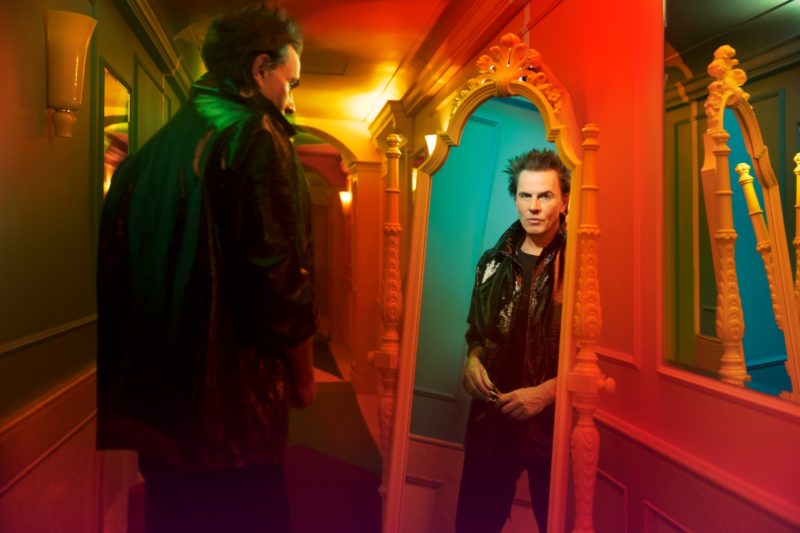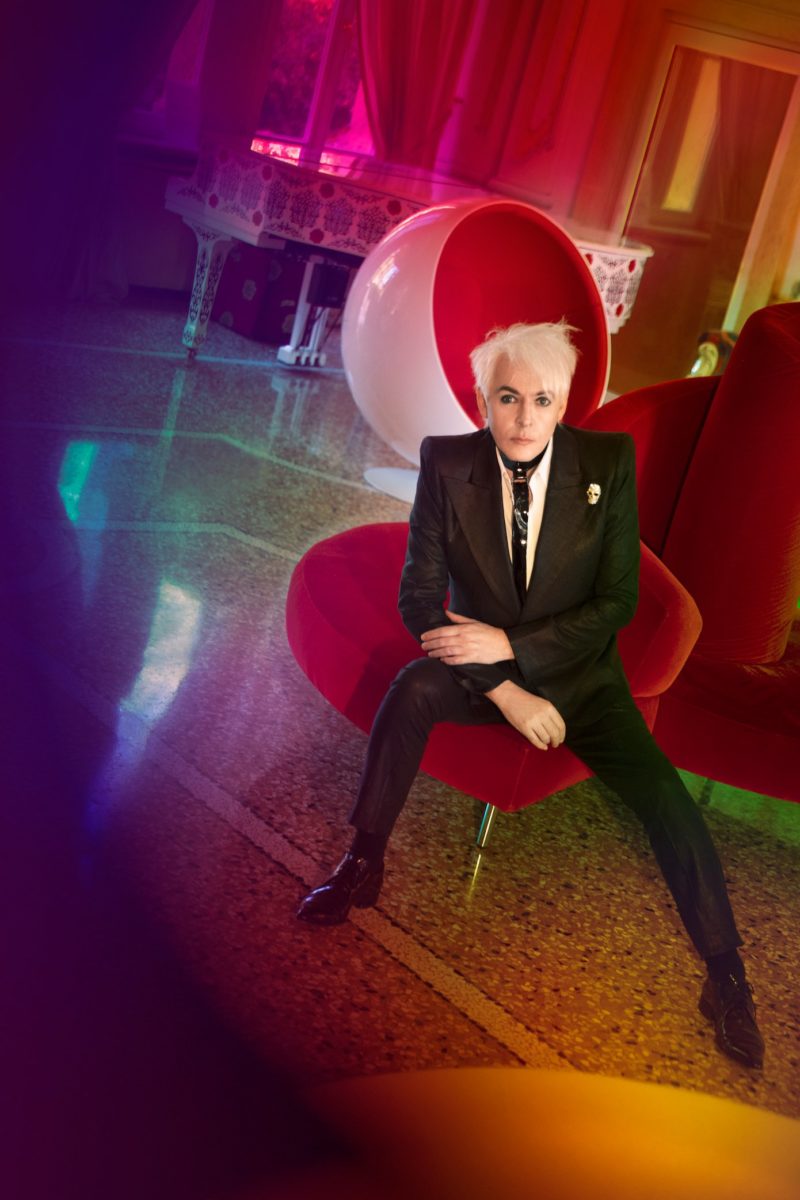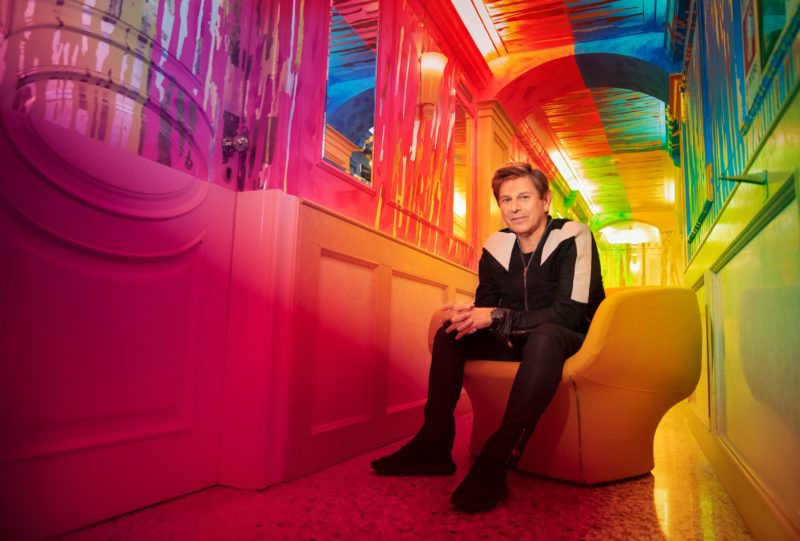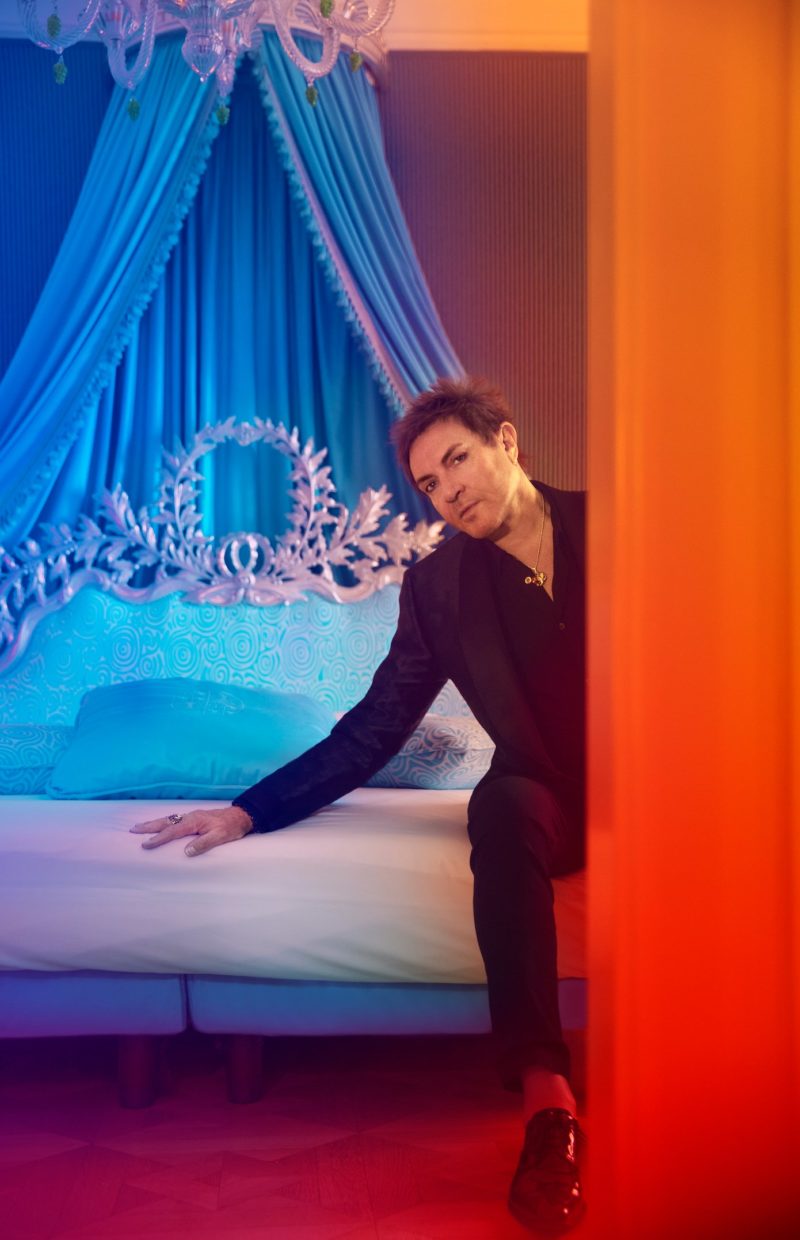On the band’s new album FUTURE PAST, Duran Duran plays no nostalgia tricks, nor does the group succumb to top 40 gimmicks. Across the album’s 51-minute runtime, Duran Duran presents touches of the dazzling and vigorous sound for which the band has come to be known over an unexpectedly modern, honest and emotionally-resonate core — a reckoning with the tumult of the present, the ghosts that linger from the past and, as the album’s title would suggest, a glimmering hope for a better tomorrow. Accompanied by robust production from Erol Alkan and stand-out additions from the likes of Mark Ronson, Giorgio Moroder, CHAI and more, FUTURE PAST reminds us that even after four decades in the business, Duran Duran still has something to say. Schön! joins John Taylor of the band to discuss success, the new album, teen magazines of yore and more.
Hello John. Lovely to chat with you today. How are you doing? How’s life?
Gosh, that’s a big question. Obviously, an album launch is always a high-energy situation… You’re just doing everything that you can do to try to give the album a good launch, and then you have to be off on the road for a couple of years. Getting back into that is intense at times. And, I had a couple of health things, like, I got a fucking diabetes diagnosis…It’s complicated, you know? I was talking to a friend last night… and I think we all kind of expect life to even out, like, ‘I’m going to get to a point where it’s just going to be like that. I’m going to be able to coast.’ But it’s just not like that. Especially if you want a certain quality of life, and a certain quality of existence, you’re always going to have to work hard for it.
That’s interesting, because I feel like you in Duran Duran intentionally work yourselves hard — every new album adopts some kind of a new sound, style, for example. And FUTURE PAST is of course a perfect exemplification of that. How has it been, coming out of quarantine and then suddenly having this album that you’re putting out into the world?
I’ve always loved the completion of an album. That’s such a big part of our life’s work, and as we get older, it’s not something we take for granted… There’s a certain success that is attached to just the completion of it, just the fact that we were all able to align ourselves for it. That’s really what it’s about for us, you know? There’s not a group of guys with one mind; there’s a group of guys with a group of minds, and we have to align those minds long enough to produce something that we can all feel comfortable putting a name on, putting the band name on. Albums almost represent for me, you know, a contest of wills — but also, harmony, compromise and democracy.
Of course. About your music — I’m a bass player myself, but I grew up in an era where recording bass was always, in one way or another, accompanied by the production capabilities of a computer. Listening to the Duran Duran discography, there was a time when you slowly evolved into that world. How did your bass playing and your approach to music in general change as that production changed?
I think that when we started out, everybody had very clearly delineated parts: I took care of my corner, he took care of his corner, you know. But in the mid 80s, the band kind of — a couple of the guys left for a period of time, and there was three of us doing the work of five. That coincided with technology arriving in a way that allowed us each one of us to tap out rhythms and create sort of funky grooves — I feel that’s when we all became producers… Now, I roll up to the studio, and my intention is to put down a drum groove. I come in with an idea for a guitar part, and everybody else does the same. And that’s just the way that it evolved.
I think that’s what makes [FUTURE PAST] work successfully, that everybody’s kind of pushed back into their corners a little bit. That’s as much as anything down to the presence of Graham Coxon and his guitar playing. There’s always somebody in the room playing guitar, and it might be a Nile Rodgers, but more likely it’s going to be me, or the engineer — it’s not going to be a star creative guitar player. [Graham] is just a fantastic guitar player. He’s one of the greatest living electric guitarists. Everything he played was interesting, and he carved out this space for himself that really, for me, took me back to version 1.0 of the band, where the guitar was this edifice. Instead of all the sounds bleeding into one another, where you can’t tell the difference between a synth and a guitar, or bass or drum, everything separated out more. That was because we had confidence in what he was doing. When you’re missing a fundamental cornerstone of your sound, and guitar was a fundamental cornerstone of the Duran Duran sound, then you tend to compensate and fill it up with all sorts of stuff. But with Graham, we didn’t have to overdo it. There’s more space on this record as a result, and it just sounds more powerful. The whole thing just works better for me.
I thought Erol Alkan did a really good job of capturing that as well. I was familiar with Erol Alkan as a DJ, but not as a producer — how did that relationship come about, and how did that work in the studio?
There’s now some kind of confusion about how he came into our world. I think he knew someone who worked at our management company and said that he’d like to work with us. We all had meetings with him — I’d never seen him as a DJ, but there was an album that he did for a German label. I forget what it’s called, but it was two curated CDs; one was older music, the other was contemporary electronic dance music. And I really loved this album. I knew the guy had taste, and he had energy… So we were like, ‘you know what? Let’s give this guy a go.’ The other thing that he said was actually, ‘How do you feel about working with Graham Coxon?’ And I was like, ‘yeah!’
I was really surprised with Erol. I did not expect him to come into the studio with such a desire to craft sounds. I’d gotten really used to other producers from the electronic world in the last 10-15 years. They can be like, ‘just give me a couple of notes and I’ll do it.’ I mean, I’ve made albums like that — you know, really lazy. Technology can really engender sort of laziness in a musician, but that was not what he wanted to do. He was very much like, ‘I want this to be the ultimate JT bass.’ And he was saying this to everybody! ‘Roger, I want this to be the ultimate Roger Taylor drum,’ — to everyone.
It’s one thing just to say it, but he took such time to get the sounds. I haven’t spent as long on bass sounds as I spent on this on this album in 20 years. I didn’t expect that from a DJ, you know? But what that did was set me up to be like, ‘okay, this dude’s taking me seriously. I’ve got to be serious, too.’ He made me want to work harder at what I do… This is not a lazy record. We’ve worked really hard. Erol fucking worked me, and I know he worked everybody.
One of the things that has stuck with me since reading your book was a story you told about seeing artists in teen magazines, and then asking why Duran Duran wasn’t in teen magazines. By eventually getting in those magazines, you started to see your popularity skyrocket. Was pushing for teen magazines solely a business decision, or was there another idea that underpinned it?
Well, things were moving very quickly. You know, in January of 1981, we put out our first single Planet Earth, and it was successful — not only was it a hit in the UK, it was a hit in one or two other countries as well. We wanted to release Girls on Film as the next single, but the record company didn’t think that was the next single… so they put out this song Careless Memories, which was cool, but it wasn’t a hit song. So suddenly, the vultures were circling — ‘they’re a one-hit wonder.’
I don’t even know what we were thinking then, but I know that I had aspirations to take the band up the steps to success… We had a record label with a press department, and I remember asking, ‘what about the teen press?’ I remembered it from when I was a kid at school, and that been only four, five years before. I was saying, ‘what about magazines like Jackie? Are they still influential?’ And they just said, ‘well, we could call them.’ On the first call, they were like, ‘we’d love to do a shoot with Duran Duran!’ And that just opened that door.
At the time, there was also this new wave of pop press really leading that direction, moving pop music media away from the more traditional black and white weekly into colour. It was a new media to reflect this new style of music that was coming out with Adam and the Ants, Bananarama, you name it… Once we showed we had a willingness to court that young, female-oriented press, even if it was just for a few months, it really opened everything up. If we hadn’t done that? Who knows.
This is a kind of a left turn, but I spent the past week watching Duran Duran videos on YouTube. Often with music from the 80s and 90s, you’ll see people will comment saying, like, ‘this music is so much better than what’s playing today!’ But if you look at most Duran Duran videos, it seems like people of all ages are enjoying the music on its own terms, without feeling the need to compare it to anything else. Why do you think that is?
Yeah. I don’t know, really. We weren’t ever really a ‘critic’s band’. Our music wasn’t really handed to the public by the mainstream press, so I’ve always felt we were a people’s band, right? We never won a lot of awards, but the public, in a very broad sense, took to us. Maybe that’s because there are so many different personalities involved… It’s like going to a buffet — there’s kind of something for everyone in Duran. If you don’t like my shtick, you like Nick. Everybody appeals slightly differently, even though it’s not always as obvious today as it was in the 80s…
We just played in Birmingham, actually. We played a couple of hometown concerts, and it was really interesting looking at the audience and seeing so many guys. I mean, there was a time where you could literally count the guys in the audience! And I just saw in the eyes of these guys… they were looking at me as if to say, ‘wow,’ like, ‘I know you.’ There was this kind of ownership that worked both ways. I knew these guys. I grew up with them, and I was, you know, the ‘chosen one’ of our neighbourhood. I think to some extent, when you set out to do whatever it is that you do, you want to make that audience proud of you.
There are two more things. One is, with this album, we gave our core fanbase an album they could be proud of. Long-term fans, mid-lifers who are still attaching themselves to us, who call themselves a fan, have to take a lot of shit, right? ‘Are you still into that band?!’ So when you give them an album that has got quite a nice quality, it’s meaningful to them because it’s personal for them. And the other thing is, I’ve really come to believe that, given a choice, the amount of people who are going to buy a ticket to see a band like ours who only want to hear old songs is very small. Most music fans, even music fans in their 40s and 50s, would like to go to see an artist — whether it’s Madonna, Billie Eilish or Duran Duran — and hear some new songs that they like. It’s one thing to hear old songs and go, ‘do you remember this?’ But there’s also something about hearing something new that makes you go, ‘I fucking love this,’ that makes you feel like you bet on the right horse. Duran Duran fans today are mostly not listening to new music. They’re just not. They put on some 80s mixtapes or whatever, and it’s very unusual for new music to come into their lives. So when you do introduce them to something new that they feel really good about, that’s worth leaning into. If you can do that, it’s worth the effort.
I’ll just ask one final question. It can be short term or long term, but what are you looking forward to right now? It could be the tour, it could just be lunch.
I’ve got a couple of weeks before I go back to work. I started painting in lockdown, and I put all my paints away, like, ‘Okay, got to go back to work. Got to get back to music.’ Then I got home for a break and I’m like, ‘fuck. I need [to paint].’ I found something very therapeutic in that, and I’m really enjoying it. So I’m looking forward to that at the moment. And yes, I am looking forward to lunch.
Courtesy of SCHON magazine





